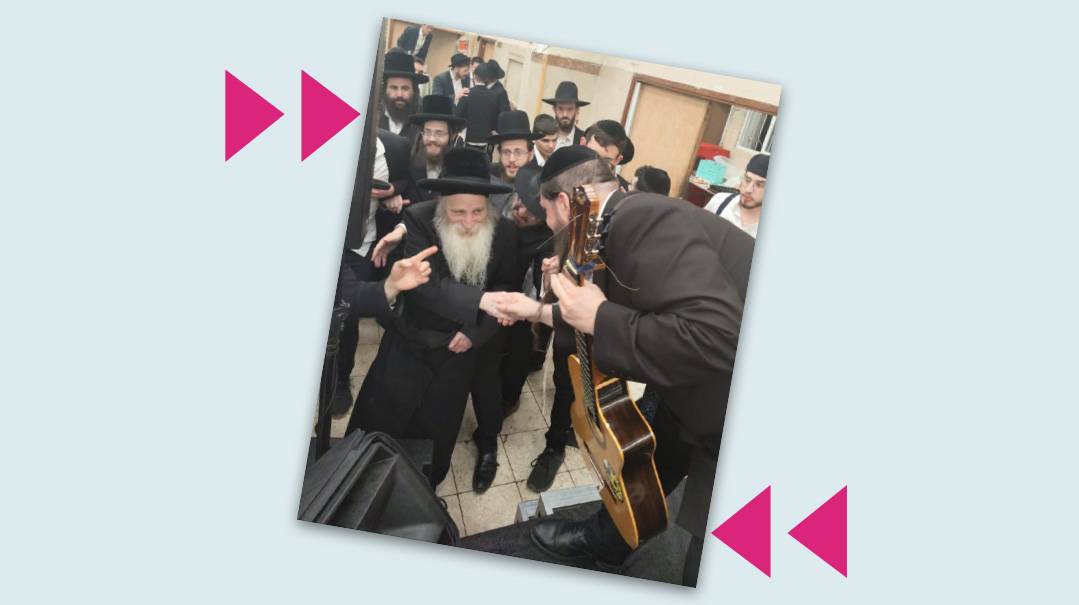What Did You Walk Down To?
| February 20, 2024If SIMCHA LEINER is the one serenading the young couple down, you’re in for a treat

Who isn’t touched by a chuppah, with its undercurrent of emotion and transcendent significance? Whether you’re close, just an acquaintance, or don’t even know who they are, there’s something so powerfully optimistic and holy in watching a couple form a new link in Klal Yisrael’s chain. The accompanying music and soaring harmonies make those moments extra-special, and if SIMCHA LEINER is the one serenading the young couple down, you’re in for a treat.
While his vocals have accompanied hundreds of chassanim and kallos, Simcha was long considering sharing the magical moments in an album of chuppah music. He travels to weddings all across the world, the families ranging from chassidish to all-American, contemporary music followers to classic niggun fans. Working on this project during the quiet seasons, he came up with the idea of producing distinct chuppah medleys of all these different styles. The album, called SHEVA: Seven Chuppah Experiences, evolved into seven sets, including an Israeli medley, a “hoiche” [elevated] medley, and a chassidish medley. Each one includes a song selection for the chassan to walk down to, one for the kallah’s procession, a “Mi Adir,” a “Mi Bon Siach,” and an “Im Eshkacheich.” There are common favorites like “Pnei Le’Elbon,” “Yedid Nefesh,” and “Vehayu Limeshisa,” and a traditional “Mi Bon Siach” of debated origin, which Leiner calls, “Adam Harishon’s Mi Bon Siach song.”
“Now, more than ever, people love crossing genres,” Simcha says. “Yanky Daskal’s ‘Liros Banim,’ which I’ve selected for the hoiche medley, is sung at Modern Orthodox weddings, and heimish chasunahs are singing the very yeshivish ‘Ki L’Hashem,’ which Rav Shmuel Brazil composed many years ago — that song is on its sixth life. At one point, at chassidishe simchahs they were dancing to the Miami Boys Choir’s ‘Adon Olam.’”
The variety of moods reflects a month in the singer’s life. “I can do a real heimishe chasunah one night, yeshivish style the next, and the next could be a chassan and kallah who aren’t religious, but their families want Jewish music at the chuppah,” he says.
The album has had the strongest reception of any of Leiner’s recent releases, its listener base not relegated to one particular circle. The first six medleys feature genuine orchestral music, reminiscent of the early Project Relax albums, which Leiner sung together with Baruch Levine. One businessman commented that on a flight to Los Angeles, he’d listened to Sheva two and a half times, calling it his “therapy for the week.”
The atmosphere of the Hoiche Medley, Leiner felt, was best achieved without orchestral arrangements or sheet music, so he worked with just a few musicians in studio on a simpler score. He’d heard the melodic baritone of Israeli vocalist Shimi Weiss at an event, and invited Weiss to enhance the singing with his incredible low tones, an entire octave below Simcha’s own solos.
Another collaboration was with badchan Shloma Yaakov Weber (son of veteran composer and badchan Pinky Weber) who wrote moving Yiddish lyrics for the song “Melech,” in the Chassidish Medley, and joins with Simcha to sing it. Child star Meir Rosinger brings his own high notes, too.
Bands have sent Simcha their own form of positive feedback—screenshots of them recommending that new clients listen to the Sheva album to get ideas and make selections of songs for their own special moments.
Mic Drop
Never Miss a Word
The recent publication of a JOURNEYS songbook, with all the music and lyrics for Abie Rotenberg’s beloved songs, means that fans can learn to accompany their favorite Journeys classics. Each song is aesthetically laid out with its melody, lyrics, chord symbols, and guitar tablatures.
Leib Yaacov Rigler put his heart and soul into preparing this treat. “I paid special attention to the physical layout so that repeated sections would be on the same page whenever possible,” he explains. “Musically, sometimes a song is sung with a lot of syncopation, which would be difficult to read. (A syncopated note is accented on a weak beat instead of the regular metrical beat.) One example of this is the word ‘whispered’ in the first line of “The Secret” from Journeys Volume 5.
“In the songbook, I notated each syncopation very clearly to ensure easy reading. I simplified the melody line, keeping the spirit of the tune, and left the nuances to the performer.”
Music editor Yaakov Brown meticulously corrected the lyrics so that no one has to suffer hearing their beloved Journeys songs sung with a word or two casually skipped or replaced. Leib Yaacov especially enjoyed arranging the piano solos at the end of the book. The solos are not for beginners, but he has included different levels — from easy to challenging — so that many aspiring pianists can learn the solos and perform them.
A SONG THAT GETS ME INTO THE ADAR SPIRIT
One of the blessings of the business is that even before Rosh Chodesh Adar, people start requesting Adar songs at weddings. It’s a wonderful way to become uplifted. My personal favorite is MBD’s “LaYehudim” from the album Hold On. The dance floor always picks up a notch when this song starts playing.
—Singer YISROEL WERDYGER
For me, Adar starts with singing Reb Meshulam Greenberger’s Megillas Esther song, “Im al Hamelech Tov….”
—Producer/musician AVRUMI BERKO
My go-to song to get everyone in the mood of Adar is “Misheh, misheh, misheh….” — the traditional one, to the tune of “Venahafoch Hu.”
—Singer MICHOEL PRUZANSKY
Any geshmake, upbeat song of emunah and bitachon works now to get us into Adar. You can feel the simchah through bitachon.
—Composer HERSHY ROTTENBERG
I’m singing “Yesh inyan shehakol yit'hapech letovah” from my last album. This encouraging saying of Rebbe Nachman is really a repetition of the venahafoch hu theme, and you can’t get more suitable than that for Adar. Halevai, may the current situation turn over, and very soon.
—Singer NAFTALI KEMPEH
“Ivdu Es Hashem Besimchah,” which is essential every day of the year, but especially in Adar.
—YOELI POLATSEK (Zemiros Choir)
One my all-time favorite songs, “Layehudim” off Yossi Green’s “The 8th Note” album.
—Singer MOSHE TISCHLER
My English single Purim, which I had the honor of releasing for kids last year. And let’s hope it helps kids connect to the beautiful Yom Tov.
—Singer/songwriter YONI Z.
(Originally featured in Mishpacha, Issue 1000)
Oops! We could not locate your form.






